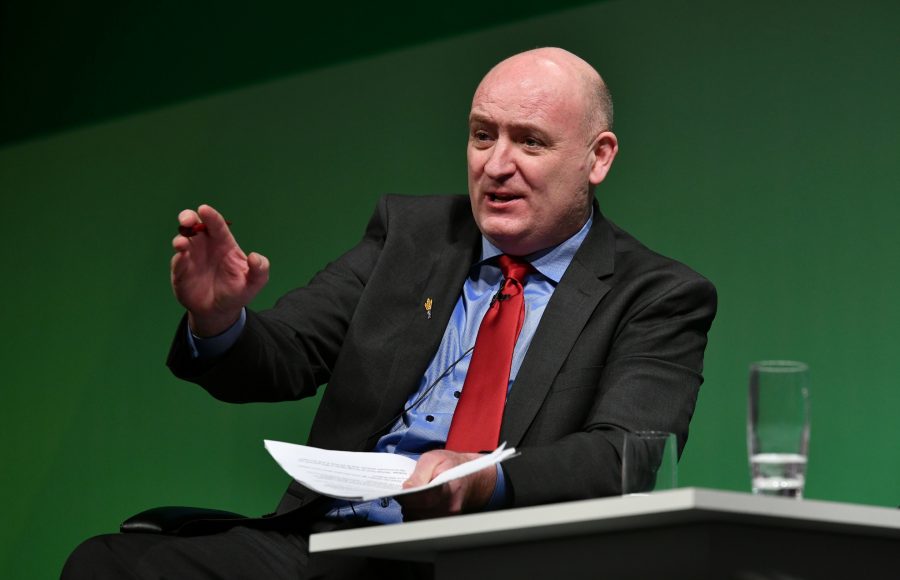AS WE close the book on what has been an eventful year, I’d like to survey the events of 2019 and look ahead to see what is on the horizon in 2020.
We’ve just emerged from the third UK General Election in four years, following what has been a period of extraordinary political instability. The result of December’s election gives the Prime Minister the majority he has been seeking to take forward his Brexit plans. Although in legal terms we cease to be an EU Member State at the end of January, there is much work ahead to secure the access we need to our nearest and most valuable export market.
Although uncertainty persists, I am ambitious for our sector. Wales’ farmers have the skills, natural resource base and ambition from which to rise to future challenges and opportunities which lie ahead. These opportunities include increasing our self-sufficiency by producing more high-quality food, securing new export markers and becoming producers of the most climate-friendly food in the world by becoming zero net emitters of greenhouse gases by 2040.
Leaving the EU at the end of January based on the current withdrawal agreement means that we enter a transition period, during which time we continue to enjoy access to the EU’s single market. We must ensure that when that transition ends, we can access that market on the most favourable terms possible, with tariff and non-tariff barriers eliminated wherever possible. The UK’s government must also avoid a situation whereby the transition period elapses without having reached an agreement on a future trading relationship with the EU, culminating in us trading with the EU on WTO terms.
Trade talks with third countries will begin soon and one point I have been making consistently, and for some time now, is that we must not allow our own high environmental and animal welfare standards to be undermined in any future trade agreements that the UK may enter into. I, therefore, want 2020 to be the year in which the new government moves ahead with the creating of a Trade and Standards Commission, which will be tasked with ensuring our high standards are upheld and respected in any future trade agreements with third countries.
2019 also saw the second stage of the Welsh Government’s consultation on the future of agricultural policy in Wales. The ‘Sustainable Farming and our Land’ consultation followed its 2018 predecessor, ‘Brexit and our Land’, and we were pleased to see these revised proposals including future support around the principle of sustainability. The union remains concerned, however, that the proposals suggest the continued supply of vital economic, social and cultural benefits provided by Welsh farming currently can be secured through what is, essentially, an agri-environment scheme. I’d like to once again thank all farmers and those living in our rural communities who responded to the consultation. We now wait for the Welsh Government to analyse the responses and bring forward the next stage of the process in 2020.
Sadly, as we welcome in the New Year, around 650 cattle farmers in Wales are affected by bovine TB restrictions and this, of course, has a significant knock-on effect on their business and family. NFU Cymru continues to lobby the Welsh Government to review its bovine TB eradication strategy and deliver a more holistic policy that tackles this disease across all its vectors. A peer-reviewed scientific report examining the effectiveness of badger culling in reducing outbreaks of TB in cattle has shown positive results in Gloucestershire and Somerset and we now look to Welsh Government to listen to the science and use all of the tools at its disposal to control the reservoir of disease in wildlife – not just through cattle controls. We also need the Welsh Government to look at the support for chronic herds in Wales and the massive impact long term breakdowns are having on these businesses.
On the dairy side, we look forward to a long-awaited consultation on statutory milk contracts. There are examples of good practice out there but what other industry would allow six weeks of payments in arrears and for processors to adjust prices at a whim? Of course, we want processors to have successful profitable businesses, but we need the same for our milk producers. After all, these are the people taking the price risk when product prices fall. This has to change as evidenced by the latest Welsh Government farm statistics when dairy farm income fell by a massive 43% in the year ending March 2019 compared to the previous 12 months. Statutory contracts will help bring back some stability which the sector needs right now.
Against the backdrop of Brexit uncertainty and low market returns, the threat of regulation continues to weigh heavily on farmers’ minds. Back in November 2018, the Welsh Government announced regulatory measures covering the whole of Wales to protect water quality from agricultural pollution coming into force in January 2020. From information provided by the Welsh Government in early 2019, it is clear the proposed new regulations are whole territory Nitrate Vulnerable Zones (NVZ) with the NVZ Action Programme requirements applied across the whole of Wales.
The Minister, in December 2019, confirmed that she will be considering advice from officials in January on the introduction of agricultural regulations following further engagement. NFU Cymru categorically rejects any proposals which include the introduction of the Nitrates Directive and Nitrate Vulnerable Zones (NVZ) across the whole of Wales. This is based on the evidence which shows an all-Wales approach simply cannot be justified; that the existing NVZs in Wales have had limited effectiveness. The great harm an all-Wales NVZ will do to farm businesses and our rural communities, which greatly outweigh any benefits to water quality, cannot be justified. We are clear, an all-Wales NVZ approach is not evidence-based, proportionate or targeted and we continue to work tirelessly to emphasise to Welsh Government the devastating impacts that an all-Wales NVZ approach will have. We urge the Minister to recognise that poor regulation serves no one – not government, not society, not the farming industry or the environment – and work with us to develop the framework to support farmers to take action to improve water quality where this is needed.
2019 has also been a year when the glare of the media on Welsh and British farming has not been as balanced as we would expect. I have long said that, as an industry, we are not immune from critique and we relish the opportunity to stand up and promote our values and leading standards. What we do not and will not accept, however, is unbalanced reporting and false news pedalled by those with an agenda against farming. This year NFU Cymru has shown we tackle such behaviour through robust complaints and other means. Please be assured that we are prepared to escalate our actions accordingly if required.
There will no doubt be huge challenges facing our industry in 2020 and beyond. As an industry, we should all be very proud of the role we play and we must remain steadfast in our ambitions to continue to deliver for the people and communities of Wales. As an organisation, NFU Cymru is ambitious for Welsh food and farming. Politicians in both Cardiff and Westminster must commit to working with us to deliver our ambition for a productive, progressive and profitable farming sector that delivers for the whole of Wales
















Add Comment